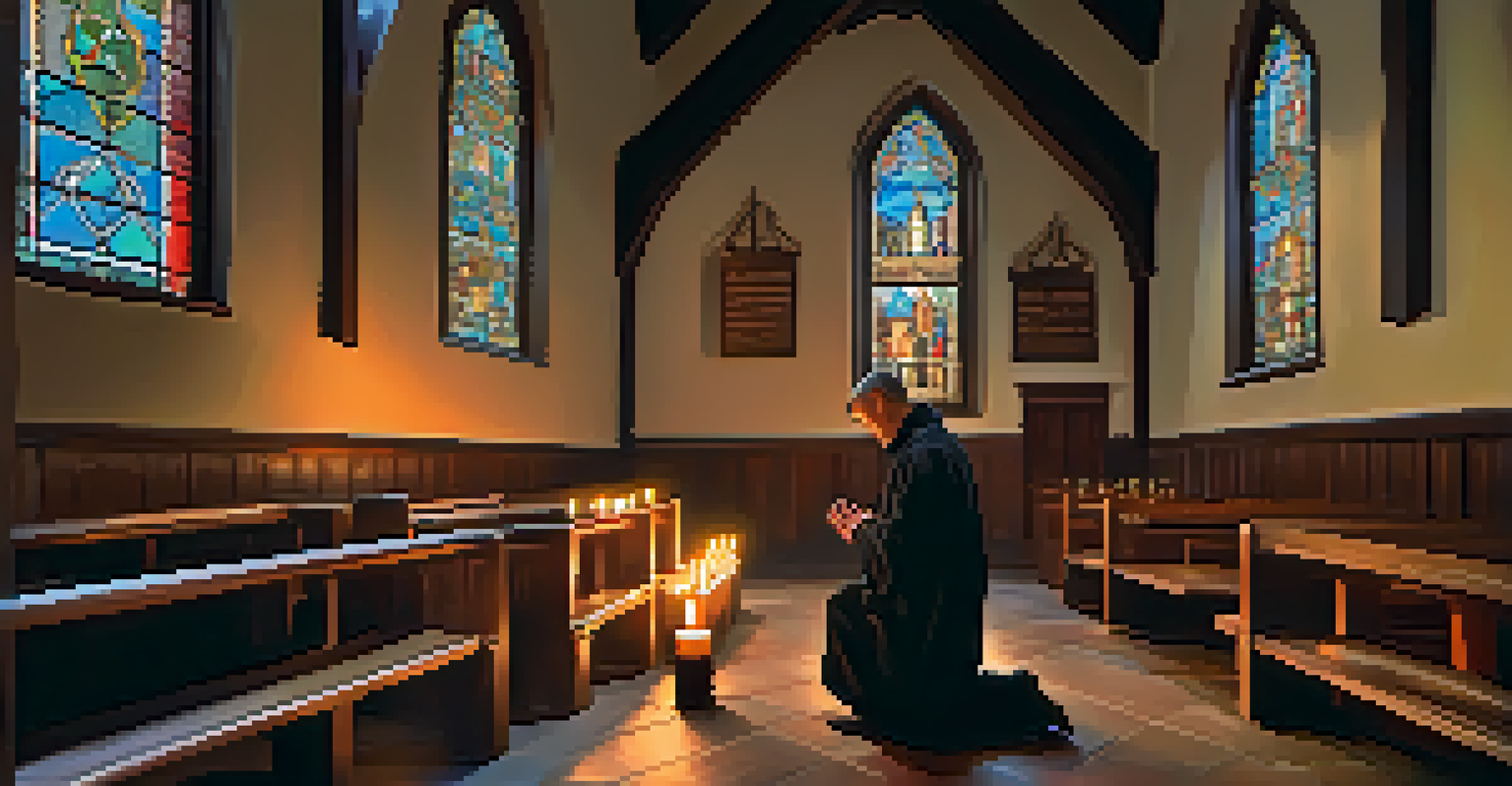The Role of Faith in Spain's Pilgrimage Traditions

Understanding the Significance of Pilgrimage in Spain
Pilgrimage is deeply woven into the cultural fabric of Spain, serving as a spiritual journey for many. These journeys often lead to significant religious sites, fostering a sense of devotion and connection among pilgrims. In Spain, the act of pilgrimage is not just about the destination; it’s about the experiences and transformations that occur along the way.
The longest journey begins with a single step.
One of the most famous routes is the Camino de Santiago, where thousands walk each year in search of personal enlightenment. This pilgrimage has roots dating back to the Middle Ages, highlighting its historical importance in Spanish society. Pilgrimages serve as a reminder of faith's enduring role in shaping community and individual identity.
As pilgrims traverse diverse landscapes, they encounter towns and villages steeped in tradition and spirituality. These interactions enrich the pilgrimage experience, allowing participants to share stories and build connections. Ultimately, the journey becomes a collective expression of faith, reflecting the heart and soul of Spain.
The Historical Context of Pilgrimages in Spain
Spain's pilgrimage traditions are deeply rooted in its historical context, influenced by various cultures and religions over centuries. From the Moors to the Catholic Reconquista, Spain's diverse past has shaped its spiritual pathways. Historical events often led to the establishment of pilgrimage routes, marking them as significant sites of faith and reflection.

The Camino de Santiago, for instance, emerged as a critical Christian route during the Middle Ages, believed to lead to the tomb of Saint James. This pilgrimage not only provided spiritual benefits but also served as a unifying force for Christians across Europe. The convergence of different cultures along these routes illustrates the rich tapestry of faith that defines Spanish pilgrimages.
Pilgrimage as a Spiritual Journey
Pilgrimage in Spain is not just about reaching a destination, but about the transformative experiences and connections made along the way.
In addition, local legends and saints have influenced the destinations of many pilgrimages. Each region boasts its own traditions and narratives, which have been passed down through generations. This historical context adds depth to the pilgrimage experience, inviting both spiritual seekers and history enthusiasts alike.
Faith as the Driving Force Behind Pilgrimages
At the core of every pilgrimage in Spain lies a profound sense of faith and devotion. Many pilgrims embark on these journeys seeking spiritual renewal, guidance, or even healing. This quest for a deeper connection with the divine is what motivates individuals to overcome challenges along the way.
The journey is the destination.
Faith manifests itself in various forms, whether through prayer, reflection, or communal worship. Pilgrims often share their personal stories, which can be incredibly moving and inspiring. These shared experiences create a strong sense of community, reinforcing the idea that faith is not a solitary pursuit but a collective journey.
Moreover, the rituals and practices associated with these pilgrimages enhance the spiritual experience. From lighting candles to attending Mass, each act serves as a reminder of the pilgrims' devotion. This integration of faith into daily actions fosters a deeper understanding of one's beliefs, making the pilgrimage a transformative experience.
Cultural Expressions of Faith During Pilgrimages
Spain's pilgrimage traditions are rich with cultural expressions, where faith and artistry intertwine. Along the routes, pilgrims encounter stunning churches, chapels, and shrines, each adorned with religious artwork that tells a story. These cultural landmarks not only enhance the spiritual atmosphere but also reflect the history and devotion of the local communities.
In addition to architecture, music and dance play a significant role in celebrating faith during pilgrimages. Many towns organize festivals that feature traditional songs and dances, creating a festive environment for pilgrims. These lively expressions of spirituality foster a sense of joy and camaraderie among participants.
Historical Roots of Pilgrimages
Spain's pilgrimage traditions are shaped by its diverse history, reflecting the influences of various cultures and religions over centuries.
Food also serves as a cultural bridge during these journeys. Pilgrims often partake in local delicacies, which can have religious significance, such as specific dishes prepared for feast days. Sharing meals becomes a communal act of faith, emphasizing the importance of fellowship during the pilgrimage experience.
The Modern Evolution of Pilgrimage Practices
While rooted in tradition, the practice of pilgrimage in Spain has evolved to reflect modern society. Today, many people embark on these journeys for reasons beyond religious obligations, seeking personal growth, adventure, or a break from the fast-paced world. This shift has broadened the appeal of pilgrimages, attracting individuals from diverse backgrounds.
The rise of social media has also transformed the way pilgrims share their experiences. Many now document their journeys online, creating communities that extend beyond the physical routes. This digital storytelling fosters connections among pilgrims around the globe, emphasizing the universal nature of the pilgrimage experience.
Moreover, modern pilgrimages often incorporate elements of wellness and self-discovery. Retreats and guided tours that focus on mindfulness and spiritual reflection have become increasingly popular. This trend highlights the ongoing relevance of pilgrimage as a means of exploration, both externally and internally.
Challenges Faced by Modern Pilgrims
Despite the enriching experiences, modern pilgrims often face various challenges along their journeys. Physical demands, such as long distances and varying terrain, can test one's endurance and determination. Additionally, the emotional toll of solitude or difficult weather conditions can impact the overall pilgrimage experience.
Navigating the logistics of a pilgrimage can also pose challenges. From securing accommodations to understanding local customs, the journey may require careful planning. This complexity can deter some from embarking on their pilgrimage, especially those new to the practice.
Modern Challenges for Pilgrims
Contemporary pilgrims face physical and logistical challenges, but these obstacles often lead to personal growth and deeper spiritual connections.
However, the challenges faced often lead to personal growth and resilience. Overcoming obstacles can deepen one's sense of accomplishment and connection to the pilgrimage. Many pilgrims find that these struggles ultimately enhance their spiritual journey, reinforcing the idea that faith is often cultivated through perseverance.
The Lasting Impact of Pilgrimages on Personal Faith
The impact of pilgrimage on personal faith can be profound, often leading to lasting changes in perspective and spirituality. Many pilgrims return home with a renewed sense of purpose and connection to their beliefs. This transformation can foster greater compassion, understanding, and appreciation for the world around them.
As pilgrims reflect on their experiences, they often find themselves more attuned to their spiritual needs. The journey can serve as a catalyst for ongoing exploration of faith, prompting individuals to seek out new practices and communities. This evolution of belief can lead to a more fulfilling spiritual life.

Furthermore, the relationships formed during the pilgrimage can have a lasting influence on one's faith journey. The shared experiences and stories create bonds that transcend the pilgrimage itself, often leading to lifelong friendships. These connections serve as reminders of the communal aspect of faith, enriching the spiritual lives of those involved.